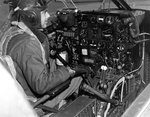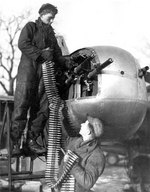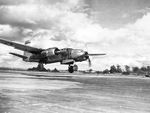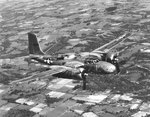A-26 Invader
| Country | United States |
| Manufacturer | Douglas Aircraft Company |
| Primary Role | Medium Bomber |
| Maiden Flight | 10 July 1942 |
Contributor: C. Peter Chen
ww2dbaseThe A-26 Invader light bombers were delivered to the United States Army Air Force beginning in Aug 1943, and they entered combat on 19 Nov 1944 in Europe. They entered the Pacific War in Jan 1945. Although their service in WW2 was short, they were highly effective and was one of the finer aircraft developed during that period.
ww2dbaseIn 1949, the B-26 Marauder was retired from active service, and the A-26 Invader took over the designation of B-26. A small number were also employed by the United States Navy for utility use under the designations of JD-1, JD-1D, UB-26J, and DB-26J. B-26 Invader bombers were used by the US Air Force during the Korean War and the Vietnam War. Some were also seen during conflicts in Cuba and the Congo. After a long career, the last A-26 bomber was retired from service in 1972; it is now in the possession of the National Air and Space Museum in Washington, DC, United States.
ww2dbaseDuring the course of the design's production life, 2,452 were built.
ww2dbaseSource: Wikipedia.
Last Major Revision: May 2007
SPECIFICATIONS
A-26B-60-DL
| Machinery | Two Pratt & Whitney R-2800-27 'Double Wasp' radial engines rated at 2,000hp each |
| Armament | 8x12.7mm M2 Browning machine guns in nose, 6x in wings, 2x in dorsal turret, 2x in ventral turret, up to 2,700kg of bombs internally, up to 900kg of bombs under wings |
| Crew | 3 |
| Span | 21.34 m |
| Length | 15.24 m |
| Height | 5.64 m |
| Wing Area | 50.00 m² |
| Weight, Empty | 10,365 kg |
| Weight, Loaded | 12,519 kg |
| Weight, Maximum | 15,900 kg |
| Speed, Maximum | 570 km/h |
| Rate of Climb | 6.40 m/s |
| Service Ceiling | 6,700 m |
| Range, Normal | 2,300 km |
Photographs
 |  |  |  |
Did you enjoy this article or find this article helpful? If so, please consider supporting us on Patreon. Even $1 per month will go a long way! Thank you. Share this article with your friends: Stay updated with WW2DB: |
Visitor Submitted Comments
6 Jan 2015 07:15:02 AM
That's great Bill, but this article is about the A-26 Invader, not the B-26 Marauder. There is a separate article for that plane.
16 Apr 2016 08:49:38 AM
In 1948 the USAF redesignated A-26 aircraft as B-26 (not to be confused with the B-26 Marauder which was retired in the same year). During the Vietnam war, however, the USAF wanted to base B-26K Invaders in Thailand, but the Thai government did not want bombers operating from its country. The Americans simply changed the designation back to A-26A, an attack aircraft, which was acceptable to the Thai government.
All visitor submitted comments are opinions of those making the submissions and do not reflect views of WW2DB.
- » Wreck of USS Edsall Found (14 Nov 2024)
- » Autumn 2024 Fundraiser (7 Nov 2024)
- » Nobel Peace Prize for the Atomic Bomb Survivors Organization (11 Oct 2024)
- » Wreck of USS Stewart/DD-224 Found (2 Oct 2024)
- » See all news
- » 1,150 biographies
- » 337 events
- » 43,917 timeline entries
- » 1,241 ships
- » 350 aircraft models
- » 207 vehicle models
- » 373 weapon models
- » 123 historical documents
- » 260 facilities
- » 470 book reviews
- » 28,537 photos
- » 432 maps
James Forrestal, Secretary of the Navy, 23 Feb 1945
Please consider supporting us on Patreon. Even $1 a month will go a long way. Thank you!
Or, please support us by purchasing some WW2DB merchandise at TeeSpring, Thank you!
20 Aug 2010 02:15:36 PM
The B-26 was a twin-engine bomber and flew
for the first time on July 10,1942 at Mines
field, that is now LAX or Los Angeles
International Airport, Los Angeles, Calif.
During its production life, the B-26 was
built in many variants. Some models had a
glass nose for a bombardier and a solid nose
w/ six or eight fifty caliber machine guns
the eight gun model carried 1,600rpg.
The B-26 was also capable of carrying 20mm,
37mm and 75mm cannons.
The crew was made up of pilot, bombardier
and gunner, who controlled both the upper and bottom turrets, by remote control.
During World War II each B-26 cost the US Government $242,595 Dollars. After WWII the
B-26 continued to serve with the USAAF, and
the new USAF, with (SAC) The Strategic Air
Command and the Tatical Air Command during
the postwar period.
The B-26 served during the Korean War in both
day and night missins, after Korea the B-26
continued to serve into the late 1960's.
TWILIGHT OF A WARRIOR
B-26's were used early in the Vietnam War by
the U.S.during the 1960's, Providing air support bombing missions. After some of the aircraft crashed due to wing spar fatigue
All B-26 aircraft were grounded, until a
solution was found.
ENTER THE B-26K COUNTER-INVADER
On Mark Engineering, at Van Nuys, Calif.
rebuilt the B-26 with more powerful engines,
propellers, enlarged tail and rudder, wings with wing tip tanks and added pylons that could carry 8,000lbs of ordnance and 4,000lbs
carried internally plus eight fifty caliber
machine guns in the nose, gave the B-26 heavy firepower.
The last mission flown by the B-26 was May 1970 the aircraft was to be retired after
serving over three decades However, the
aircraft continued to serve a few more years
but most of them were scrapped.
CIVILIAN LIFE
Most of the B-26's were scrapped but, a few
were sold surplus and found new jobs, as
fire bombers and fast private executive
aircraft, some have been restored as WWII
Warbirds, on display at museums, and fly at air shows across the USA.